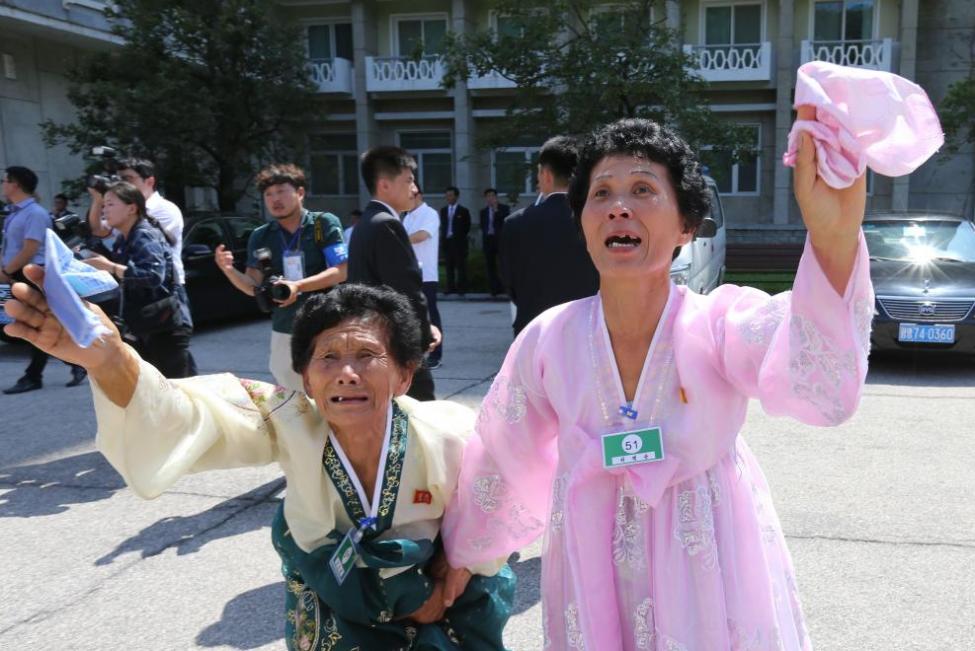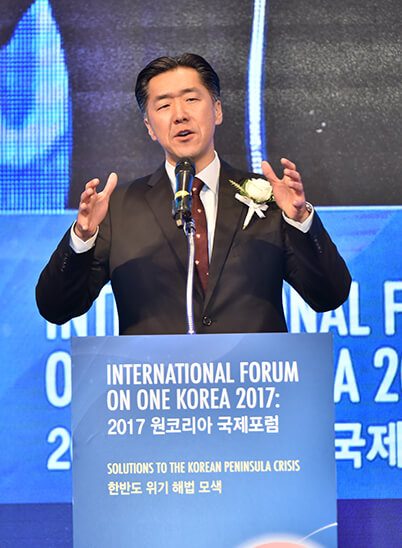Can you imagine being separated from your child for 68 years?
In a pre-reunion interview, South Korean Lee Keum-seom described how she and her husband were separated during their escape from the line of fire during the Korean War.
She carried her 1-year-old daughter, her husband held the hand of their 4-year-old son. She stopped by the side of the rode to breastfeed her infant, but sprained her ankle. By the time she returned to the main road, she could see no signs of her husband. Later she learned he turned back with their son to find her and their daughter.
That was the last she ever saw of her husband and son.
She eventually made it to South Korea, where she waited for them to arrive. But they never did.
“I cried every day for one year,” she said.
On August 22, for the first time in 68 years, she was reunited with her now 71-year-old son. Tossing all etiquette aside, she shouted his name, “Sang Chol,” and embraced him in her arms.

North Korean Ko Jeong-hui (L), 77, and Lee Gyeong-sun (R), 53, bid farewell to South Korean family member Lee Geum-yeon (not pictured), 87, at the Mount Kumgang resort, North Korea, on Wednesday. File Photo by O Jongchan/EPA-EFE
Her tears were mirrored in faces around the banquet hall where the Korean family reunions were held.
But the reunions are bitter sweet. The Red Cross reports that more than 70% of the participants report symptoms of depression after the reunions.
Three days later, of which only 12 hours were spent with her son, Lee Keum-seom sat in a bus, wiping tears off her face as she said “good bye,” probably for the final time.
Many of the reunion participants are at the end of their lives. Four candidates had to drop out last minute due to health reasons.
Moreover, the 89 reunions represent only a small percentage of families than will never see each other, some never knowing if their family is alive, or how they lived. Did they have sons and daughters, in-laws and grandchildren?
Since 1988, the South Korean Ministry of Unification has documented over 132,000 South Koreans who have registered as members of separated families. More than half have passed away, and only 89 of the 52,000 living registered family members participated the most recent reunions.
Participants from South Korea gathered at a hotel in Seokcho for orientation and a final health exam before they boarded buses to meet their family across the DMZ. Kim Seong-jin’s father didn’t make the lottery selection. He came to the event in protest and to make a case for his father. “I don’t know when he will die,” he said of his father. “He is beginning to show signs of dementia. Before he loses everything, he wants to go too, But all he can do is to watch through television each time and get hurt.”
Park Kyung-seo, president of the South Korean Red Cross, told CNN that the separation and limited reunions are a “human tragedy.”
Dr. Hyun Jin Preston Moon has used the same term to describe the traumatic rupture in personal histories of Koreans that continues to this day. The limited family reunions accentuate this reality, and are a powerful call for reunification.

Dr. Hyun Jin Moon speaks at the 2017 International Forum on One Korea in Seoul.
“The Korean people have always been one family, separated by the current 70-year division but united by their shared history, heritage and culture,” said Dr. Moon. “If we do not take up the challenge to heal the wounds of division and make the Korean family whole again, we will be turning our backs on those virtues and qualities that defined our identity as Koreans.”
Dr. Moon, author of the Korean Dream has called on Koreans in the South, North and diaspora to reconnect to their shared heritage and identity as a people who live to to “benefit humanity” as a foundation for peaceful reunification.
He has initiated and provides ongoing leadership to a growing global effort to foster such engagement towards reunification, the One Korea Global Campaign. Reunification, he has said, is the only long-term solution to heal the deep wounds of divided Korean family.
“The final outcome for the Korean peninsula rests in the hands of the Korean people, who are bound together by a historic cultural heritage that transcends politics and ideology” said Dr. Moon.
In Korean Dream, Dr. Moon calls on Koreans in the South, the North and the diaspora to rediscover their 5,000-year-old heritage and destiny and lead the reunification effort. Rooted in the philosophy of Hongik Ingan or “living for the benefit of all humanity,” Korean Dream empowers the Korean people to embrace their founding principles to build a model nation that honors the dignity and freedoms of its people, and ultimately brings “broad benefit” to all humanity.
Dr. Moon initiated and provides ongoing leadership for Action for Korea United (AKU), an unprecedented grassroots coalition of over 900 organizations building consensus around the vision for a unified Korea. AKU is carrying out numerous initiatives to bring awareness about the importance of Korea reunification, especially to the youth of Korea. Action for Korea United has partnered with the Global Peace Foundation, EastWest Institute, and One Korea Foundation to launch the One Korea Global Campaign, which is building a grassroots Korean-led movement for Korean reunification and garnering international support for this cause.
“When we Koreans, in both North and South, look at our common history, the current 70-year division is but a drop in the ocean of centuries of shared experiences, traditions, and culture,” said Dr. Moon. “To achieve unification, we must revive the core ideals that still burn deep within the Korean consciousness.”
